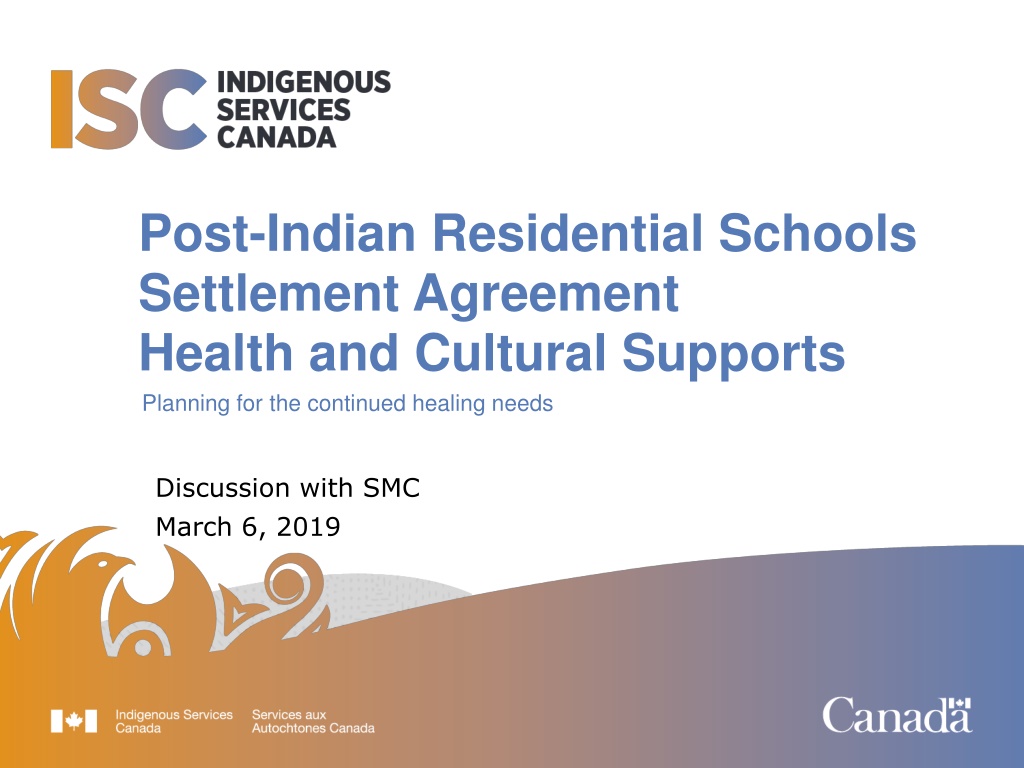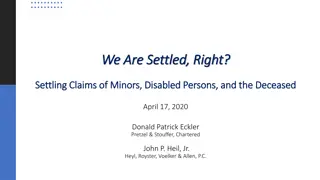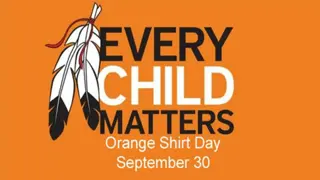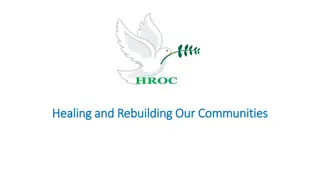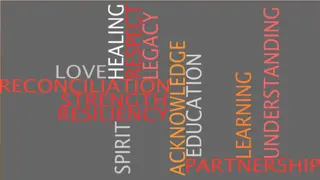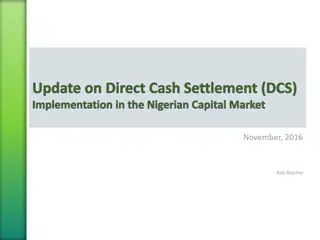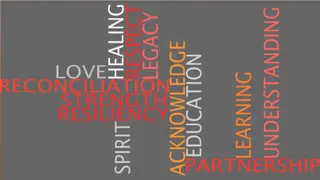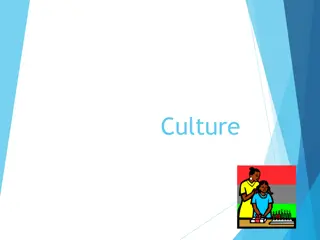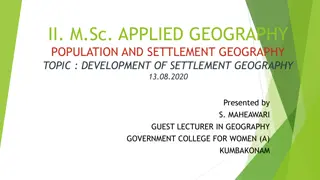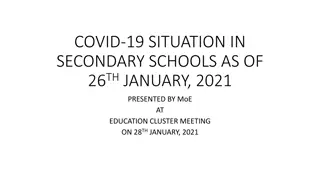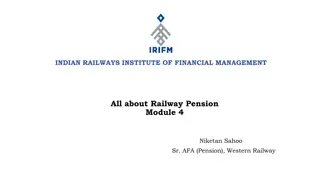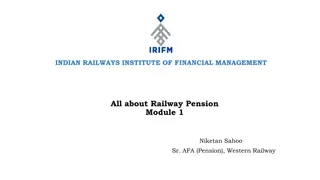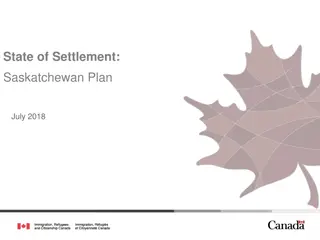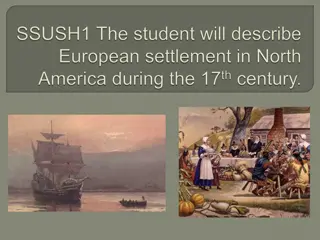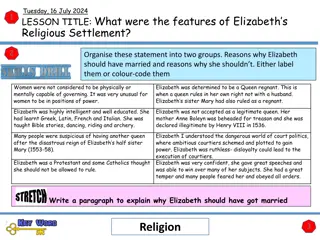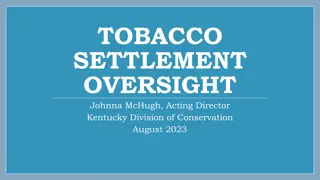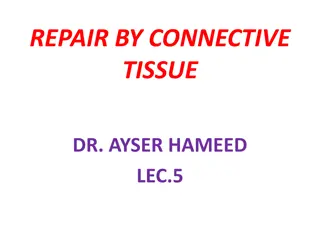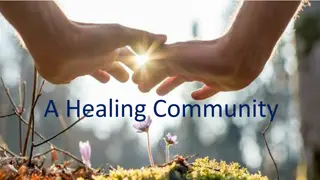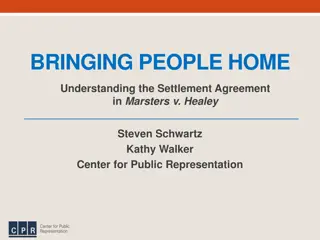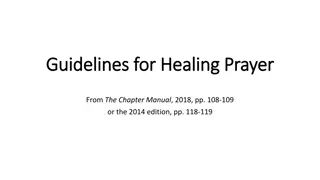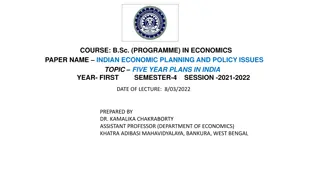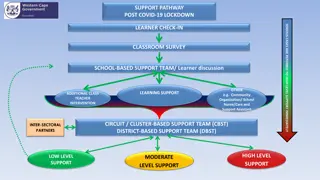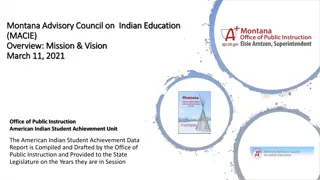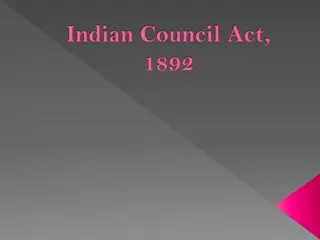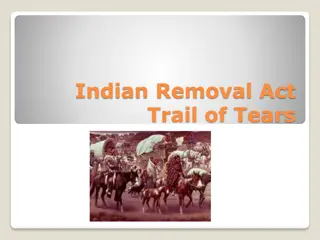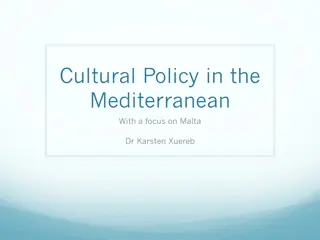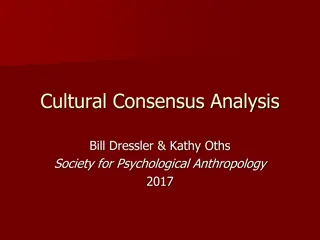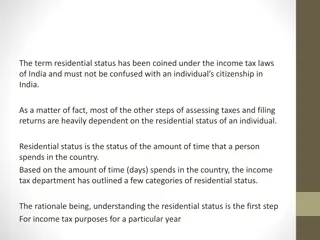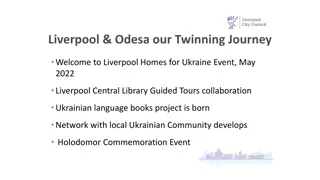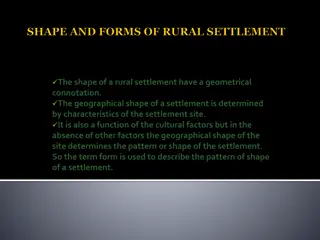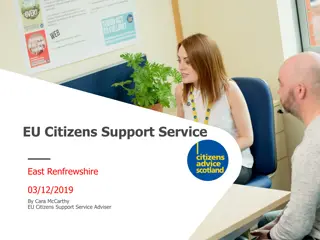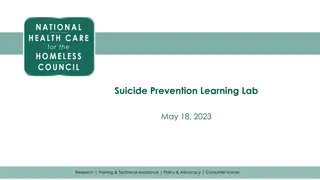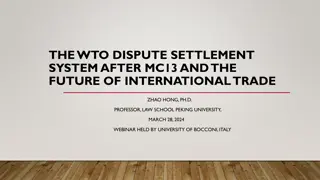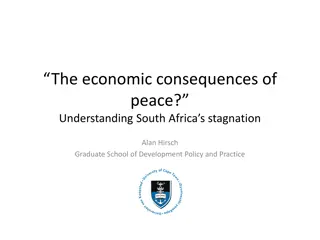Continued Healing and Cultural Support Planning Post-Indian Residential Schools Settlement
The discussion focuses on the ongoing need for health, cultural, and healing supports post-Indian Residential Schools Settlement Agreement. It highlights the importance of aligning future approaches with Indigenous health priorities and outlines considerations for the IRS Health Support Program. The need for services continues to rise, emphasizing the unique healing journeys of individuals and communities. Feedback is sought to shape engagement and address key priorities in meeting these ongoing needs.
Download Presentation

Please find below an Image/Link to download the presentation.
The content on the website is provided AS IS for your information and personal use only. It may not be sold, licensed, or shared on other websites without obtaining consent from the author. Download presentation by click this link. If you encounter any issues during the download, it is possible that the publisher has removed the file from their server.
E N D
Presentation Transcript
Post-Indian Residential Schools Settlement Agreement Health and Cultural Supports Planning for the continued healing needs Discussion with SMC March 6, 2019
Objectives Share status of Indian Residential Schools Resolution Health Support Program (IRS RHSP) and acknowledge ongoing need for health support services post-Settlement Agreement including related issues and broader types of support. Identify key priorities, questions, and opportunities for shaping conversation with partners around meeting this need. Seek SMC feedback on engagement approach. 2
Background The Indian Residential Schools Settlement Agreement (IRSSA) is currently anticipated to end in 2021. However, the need for ongoing healing, health and cultural supports from the intergenerational trauma linked to Indian Residential Schools will not end with the Settlement Agreement. Future approach to providing health and cultural supports should be aligned with health priorities of Indigenous partners articulated in the First Nations Mental Wellness Continuum Framework (FN MWCF) and National Inuit Suicide Prevention Strategy (NISPS). The knowledge and insights of survivors, their families, and service providers will be valuable to inform a future approach to meet this continued need. 3
Considerations going forward IRS RHSP is part of a continuum of mental wellness supports, guided by the First Nations Mental Wellness Continuum Framework and National Inuit Suicide Prevention Strategy Partners continue to emphasize the importance of community control of health programs and services Mental wellness program alignment will remove program silos and increase funding flexibility beginning April 2019. As a Special Purpose Allotment (SPA), IRS RHSP was not included in the aligned MW program Shift from SPA to community-based funding model will leave a gap for current IRS RHSP clients who are ineligible for NIHB or community programs Strong desire for IRS health and cultural support services to continue without interruption to ensure workforce continuity 4
Ongoing need for Services Increased recognition that there is a need for ongoing healing Data demonstrates the demand for IRS RHSP continues to rise Cultural and emotional support services are most in demand Every person s and community s healing journey is unique; there is no singular IRS Experience and there is no prescribed timeframe for healing Emerging support needs arising from Day Schools/Scholars, the Notice Program, 60s scoop, ongoing trauma from child welfare, and those affected by Missing and Murdered Indigenous women and girls Giniigaaniimenaaning (Looking Ahead), by Christi Belcourt Stained glass window in Parliament commemorating the legacy of residential schools 5
Indian Residential Schools Resolution Health Support Program # of Counselling Sessions and # of Clients Choosing to Access Counselling Sessions 90,000 85,146 75,647 80,000 70,000 # of Counselling Sessions 56,336 60,000 52,414 50,501 47,845 50,000 39,276 40,000 30,000 20,000 12,363 10,631 7,508 7,224 10,000 5,018 5,427 5,756 0 2011/12 2012/13 2013/14 2014/15 2015/16 2016/17 2017/18 # of Counselling Sessions # of Clients Choosing to Access Counselling Between 2011/12 and 2017/18 Total # of Counselling Sessions: 407,164 Total Number of Clients*: 53,927 *may include repeat clients from one year to the next 6
Indian Residential Schools Resolution Health Support Program # of Client Interactions with Cultural & Emotional Supports and # of Clients Who Choose to Access Cultural & Emotional Supports 1,200,000 997,077 951,444 954,405 1,000,000 # of Client Interactions 800,000 707,380 644,700 630,698 600,000 350,693 400,000 183,669 143,313 200,000 129,323 123,795 105,738 95,660 63,031 0 2011/12 2012/13 2013/14 2014/15 2015/16 2016/17 2017/18 # of Interactions # of Clients Choosing to Access Cultural & Emotional Supports Between 2011/12 and 2017/18 Total # of Client Interactions: 5.2 million Total Number of Clients*: 844,529 *may include repeat clients from one year to the next 7
Tentative Timelines for IRS RHSP Way Forward Federal Election period June-Oct 2019 Provide Options to Senior Officials Fall 2020 Pre-engagement Process March 2019 DRAFT Proposal for ongoing health supports Spring 2020 End of Current Funding Allocation for IRS RHSP Engagement April- June 2019 Spring 2021 8
Draft Engagement Priorities Add to the evidence base for the need for ongoing health and healing supports Priority for former students, their families, elders, and service providers to share vision for the evolution of program Minimize risk of re-traumatization (e.g. draw on NCTR Lessons Learned rather than re-engaging survivors) Leverage existing opportunities (e.g. regional meetings, AFN Mental Wellness Forum) Use a variety of approaches (e.g. key informants, surveys, focus groups) Draw on work of partners and existing program holdings (e.g. FNIGC IRS Report) 9
Pre-engagement (Beginning March 2019) Discussions with regional co-management tables Seek mandate for regional engagement Refine engagement approach and engagement questions Identify key informants and external partners Use FN MWCF (grey ring) to consider tailored engagement needs and questions 10
Regional and National Engagement (April-June 2019) Regions to lead guided discussions on future of IRS health and cultural support needs (i.e. monthly/quarterly IRS RHSP events) $300k funding for regional engagement. (Combined for all regions) Proposed National gathering for IRS RHSP and CSP workers Recommended by IRS RHSP Regional Coordinators AFN Mental Wellness Forum (April 2019) Opportunity to capture range of perspectives on future health and cultural support needs from people involved in mental wellness +/- 700 expected participants Day 1 dedicated to IRS Explore other opportunities with specific attention to Inuit Consideration: Short timelines 11
Next Steps Return to SMC for feedback discussion and approval of approach (March 2019) Engage a researcher to develop a paper on program outcomes Discussion of approach at regional co-management tables (dates TBC) Map out engagement opportunities at the regional, national, and partnership tables Refine engagement approach and engagement questions with regions and partners Return to SMC in fall 2019 and identify further opportunities for validation confirmation with partners 12
Annex 1- Draft Engagement Questions (TBD with regions and partners) How should the ongoing healing needs of former students and families be addressed following IRSSA? What are the successes, challenges, barriers, gaps of IRS RHSP? What are the key considerations for meeting continued healing needs in the future? How does IRS RHSP currently fit in the continuum of mental wellness supports? What should change? What would health and cultural supports look like in the context of ongoing implementation the FN MWCF and the NISPS? What are the key considerations around the IRS RHSP workforce? What has been the role of the workforce in supporting community wellness capacity? What needs to be considered to support workforce continuity in the context of mental wellness teams and problematic substance use workers? What is your vision for the post-IRSSA ongoing health and cultural supports? How best to align the future vision with UNDRIP, TRC Calls to Action, FN MWCF, NISPS? How to balance the desire to protect the healing needs of former students and their families with the movement toward community flexibility? How can health and cultural supports be leveraged to respond to emerging needs and support holistic approaches, land based healing, family-centered treatment, child-centered approaches? Other questions? 13
Annex 2- Draft Engagement Approach: Post 2021 Planning National Regional Targeted Timelines Internal IRS RHSP Regional Coordinators Face- to-face November 2018 Complete FNIGC Report, Complete Complete Call with NCTR, Complete SMC Presentation March 5-6, 2019 Former Students: Engagement Report from NCTR expected March 2019 March 2019 Pre-engagement calls with regional co-management tables March 2019 FN MWCF Secretariat Meeting March 8, 2019 Guided discussions with internal partners: MW program leads, NIHB, CIAD, etc March 2019 Guided discussion with CIRNA March 2019 AFN Mental Wellness Forum, April 1-5, 2019 TBD: Guided discussions with organizations serving youth, two spirit and LGBTQ2S, people affected by child welfare system and justice system, IRS RHSP service users, CA holders April- June 2019 Regions lead guided discussions on IRS RHSP at monthly/ quarterly IRS RHSP worker calls and events April-June 2019 Proposed National Gathering for IRS RHSP workers, June 2019 Proposed NICoH discussion, TBD April June 2019 Report on program level IRS RHSP data April 2019 Commission Outcomes Report, TBD AFN IRS RHSP Next Steps Report, TBD 14
Annex 3 Post- IRSSA Health and Cultural Support Workplan D R A F T - evergreen Commitment / Activity Actions/Tasks FNIHB Lead Consult Deadline 1A Work internally to determine program implications 1) Regional IRS RHSP Coordinators Meeting 2) meet with other program areas to engage in discussion 3) Work with CIRNA to develop overall strategy PHPCD / SPPI NIHB and CIRNA - RIA/PSD Winter 2018/19 1B Work with Regions to identify next steps 1) hold regional level calls to engage Regions 2) identify upcoming opportunities for engagement PHPCD Regions Winter 2018/19 Engagement 1C Engage with stakeholders and partners (including provinces/territories) 1) Identify upcoming opportunities: AFN MW Forum, FNMWCF Implementation team, NCTR, National Council for Reconciliation 2) Identify key external partners 3) develop engagement plan and approach 4) implement plan and approach PHPCD Stakeholders and partners Winter 2018/19 2A Engage external researcher to complete impact study 1) engage in discussions with external experts (Dr. Bombay / FNIGC) 2) determine scope and parameters for research study 3) establish contract SPPI / PHPCD External researchers (e.g., Dr. Amy Bombay) FNIGC Winter 2018/19 2B Complete analysis of existing program- level data for IRS RHSP 1) determine available data 2) develop report of relevant indicators PHPCD SPPI Winter/Spring 2019 Research 3A Advance policy proposals 1) identify opportunities for advancing policy proposals 2) determine relevant timing 3) create links to other initiatives / frameworks SPPI / PHPCD CIRNAC - RIA / PSD Central Agencies Winter 2019 Development 3B Work closely with CIRNAC to identify 1) identify policy opportunities 2) develop proposals in consultation with CIRNAC (as appropriate) 3) identify pros and cons for each possible policy opportunity SPPI / PHPCD CIRNAC - RIA / PSD Central Agencies Winter 2019 policy opportunities Policy 15
